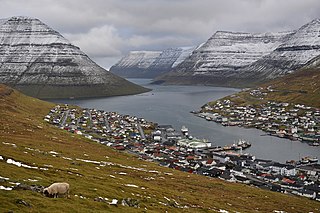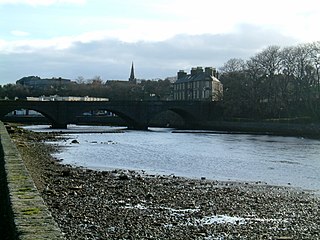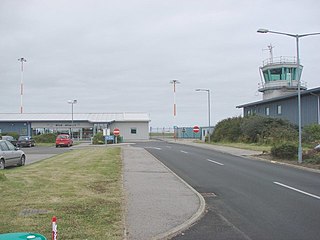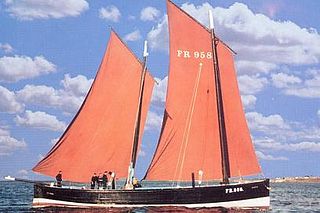
Kirkwall is the largest town in Orkney, an archipelago to the north of mainland Scotland.

Caithness is a historic county, registration county and lieutenancy area of Scotland.

Klaksvík is the second largest town of the Faroe Islands behind Tórshavn. The town is located on Borðoy, which is one of the northernmost islands. It is the administrative centre of Klaksvík municipality.

Wick is a town and royal burgh in Caithness, in the far north of Scotland. The town straddles the River Wick and extends along both sides of Wick Bay. "Wick Locality" had a population of 6,954 at the time of the 2011 census, a decrease of 3.8% from 2001.

Lairg is a village and parish in Sutherland, Scotland. It has a population of 891 and is at the south-eastern end of Loch Shin.

Watten is a small village in Caithness, in the Highland area of Scotland, on the main road (A882-A9) between the burgh of Wick and the town of Thurso, about twelve kilometres west of Wick and close to Wick River and to Loch Watten. The village is on The Far North railway line but trains stopped calling at the village in 1960. The railway station is now a private house.

Golspie is a village and parish in Sutherland, Highland, Scotland, which lies on the North Sea coast in the shadow of Ben Bhraggie. It has a population of around 1,350.

Lybster is a village on the east coast of Caithness in northern Scotland. It was once a big herring fishing port.

Wick John O' Groats Airport is located 1 nautical mile north of the town of Wick, at the north-eastern extremity of the mainland of Scotland. It is owned and maintained by Highlands and Islands Airports Limited. The airport provides commercial air travel connections for Caithness, with scheduled services to Aberdeen Airport and, until early 2020, Edinburgh. It remains regularly used by helicopters servicing local offshore oil operations and the Beatrice Offshore Windfarm. It also serves as a stop-over for light aircraft ferry flights between Europe and North America via Iceland. The airport also operates an out of hours call-out service for air ambulances, coastguard and police flights.

The Fifie is a design of sailing boat developed on the east coast of Scotland. It was a traditional fishing boat used by Scottish fishermen from the 1850s until well into the 20th century. These boats were mainly used to fish for herring using drift nets, and along with other designs of boat were known as herring drifters.

Kildonan railway station is a railway station near Kildonan Lodge in the Highland council area in the north of Scotland. It is located on the Far North Line, between Helmsdale and Kinbrace, 111 miles 5 chains (178.7 km) from Inverness, and has a single platform which is long enough for a three-coach train. All services are operated by ScotRail, who manage the station.

Georgemas Junction railway station is a railway station located in the Highland council area in the far north of Scotland. It serves several rural hamlets in the historic county of Caithness, including Georgemas, Roadside and Banniskirk. It is also the nearest station to the village of Halkirk, which lies approximately 1.6 miles (2.6 km) west of the station.

Thurso railway station is a railway station located in Thurso, in the Highland council area in the far north of Scotland. It serves the town of Thurso and its surrounding areas in the historic county of Caithness. It is also the nearest station to the port of Scrabster, which has ferry services linking the mainland with Stromness on the Orkney Islands. It is the northernmost station on the National Rail network.

Wick railway station is a railway station located in Wick, in the Highland council area in the far north of Scotland. It serves the town of Wick and other surrounding areas in the historic county of Caithness, including Staxigoe, Papigoe and Haster. The station is the terminus of the Far North Line, 161 miles 36 chains from Inverness. It is managed by ScotRail, who operate all trains serving the station.
The Moray Firth fishing disaster of August 1848 was one of the worst fishing disasters in maritime history on the east coast of Scotland, and was caused by a severe storm that struck the Moray Firth. The event led to widespread improvements to harbours and significant changes to the design of fishing boats over the remainder of the 19th century.

The Wick and Lybster Light Railway was a light railway opened in 1903, with the intention of opening up the fishing port of Lybster, in Caithness, Scotland, to the railway network at Wick. Its construction was heavily supported financially by local government and the Treasury. It was worked by the Highland Railway.
The Sutherland and Caithness Railway was a Scottish railway company that built a line from Helmsdale, the terminus of the Duke of Sutherland's Railway to Wick and Thurso in Caithness, giving the northern towns access to Inverness. It was driven through by the efforts of the 3rd Duke of Sutherland and the engineer Joseph Mitchell in the face of apathy from interests in Wick.
Caithness Glass is a Scottish artistic glassware manufacturing company. It was established in Wick, Caithness, Scotland in 1961 by Robin Sinclair, 2nd Viscount Thurso. It was rescued by George Mackie, Baron Mackie of Benshie in 1966. Mackie was chairman for the next two decades. Since 2006, the company has been based in Crieff, Perthshire. The company was created to help create additional employment in the face of continuing decline in local fishing and agriculture and also to take advantage of the easy availability of sand for glassmaking in Caithness. The local sand however proved unsuitable for manufacturing clear glass. The company soon specialised in the manufacture of glass paperweights, plus some ornamental glassware. The firm also became well known for supplying the annual trophy for the BBC Mastermind television quiz programme. The company was awarded a Royal Warrant by the Queen Mother in 1968.
Matthew Jonathan Wicks is an English former professional footballer who played as a central defender.

The Noss Head Lighthouse is an active 19th-century lighthouse near Wick in Caithness in the Highland council area of Scotland. It is located at the end of Noss Head, a peninsula on the north-west coast of Caithness that overlooks Sinclairs Bay, three miles north-east of Wick. It is notable as being the first lighthouse that was built with a diagonally-paned lantern room.

















